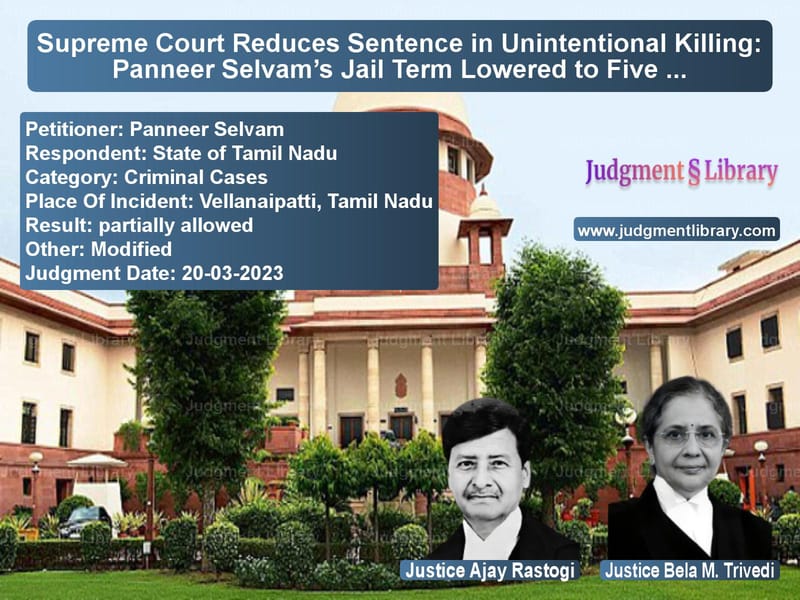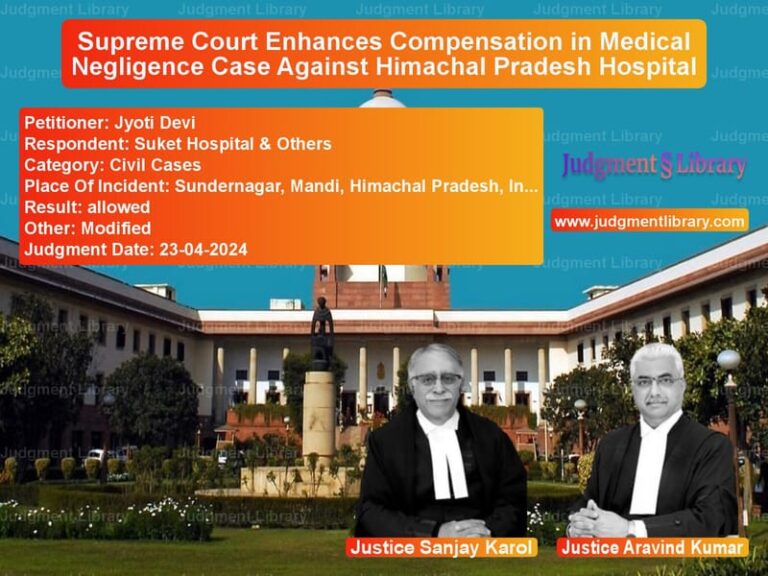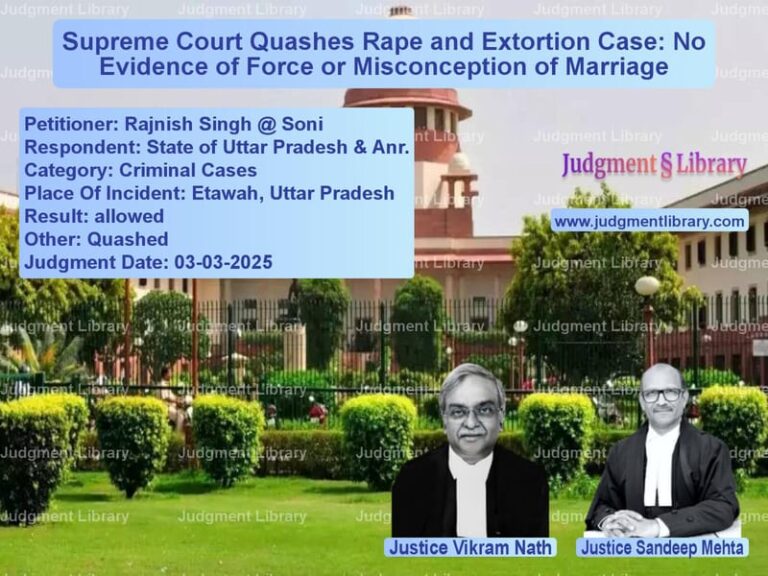Supreme Court Reduces Sentence in Unintentional Killing: Panneer Selvam’s Jail Term Lowered to Five Years
The Supreme Court of India has reduced the sentence of Panneer Selvam, convicted under Section 304(ii) of the Indian Penal Code (IPC) for the death of Mahalingam. In the case of Panneer Selvam v. State of Tamil Nadu, the Court ruled that the absence of premeditation and excessive cruelty justified reducing his jail term from seven years to five years.
Background of the Case
The incident took place on April 14, 2015, during the Mariamman Kovil festival in Vellanaipatti village, Tamil Nadu. The appellant, Panneer Selvam, and the deceased, Mahalingam, were relatives and frequently quarreled. Mahalingam often pressured Selvam to procure liquor for him, leading to tensions between them.
On the day of the incident, Selvam invited Mahalingam and another individual, Sarathkumar Samy (PW-2), for drinks. Around 5:15 PM, an argument erupted between Selvam and Mahalingam near Nilambur Road. The appellant repeatedly struck Mahalingam, causing him to fall to the ground. Even after Mahalingam was immobilized, Selvam continued attacking him, pressing him down with his legs.
Read also: https://judgmentlibrary.com/supreme-court-acquits-murder-convict-pradeep-kumar-freed-after-19-years/
Ponnusamy (PW-3), a passerby, helped inform Mahalingam’s brother, Arulkumar (PW-1), who rushed him to the Government Hospital in Coimbatore. Mahalingam succumbed to his injuries the next day, leading to an FIR at Kovilpalayam Police Station.
Trial Court and High Court Rulings
The 3rd Additional District and Sessions Court, Fast Track Court, Coimbatore, acquitted Selvam of murder (Section 302 IPC) but convicted him under:
- Section 304(ii) IPC (culpable homicide not amounting to murder) – 7 years rigorous imprisonment and a fine of ₹5,000.
- Section 506(i) IPC (criminal intimidation) – fine of ₹1,000 or four weeks simple imprisonment in default.
The Madras High Court upheld this decision on March 29, 2019.
Petitioner’s Arguments (Panneer Selvam)
The appellant, represented by Senior Advocate S. Nagamuthu, argued:
- The altercation was spontaneous, without premeditation.
- There was no undue advantage or excessive cruelty.
- Selvam had already served over four years in jail.
- His elderly parents depended on him.
- The punishment should be reduced to the sentence already served.
Respondent’s Arguments (State of Tamil Nadu)
The State of Tamil Nadu, represented by Dr. Joseph Aristotle, countered:
- The Sessions and High Courts had already shown leniency by not convicting the appellant under Section 302 IPC.
- A further reduction in sentence would be inappropriate.
Supreme Court’s Judgment
The Supreme Court bench, comprising Justices Ajay Rastogi and Bela M. Trivedi, partially allowed the appeal, reducing the sentence from seven years to five years.
“The Sessions Court rightly held that there was no premeditation, nor did the accused take undue advantage or act in a cruel manner. Given these circumstances, reducing the sentence to five years serves the interest of justice.”
The Court noted:
- The incident arose from a sudden fight.
- The accused did not use a weapon.
- There was no prior plan to cause death.
- The victim provoked the accused by persistently pestering him for liquor.
- Selvam’s family circumstances warranted leniency.
Key Takeaways from the Judgment
For Criminal Law:
- Not all deaths during fights amount to murder.
- Section 304(ii) IPC applies when there is no intent to kill but knowledge that an act could cause death.
- Sentence reductions depend on provocation, excessive cruelty, and premeditation.
For the Judiciary:
- Court discretion in sentencing must balance punishment with reformation.
- Family circumstances and past conduct play a role in sentence determination.
For Legal Practitioners:
- Defending culpable homicide cases requires proving lack of intent.
- Sentencing mitigation arguments should highlight the absence of premeditation and excessive cruelty.
Conclusion
The Supreme Court’s ruling in Panneer Selvam v. State of Tamil Nadu reinforces the importance of fair sentencing. By reducing the appellant’s sentence, the Court recognized that the crime was not preplanned and that circumstances warranted a more lenient punishment.
This judgment will serve as a guiding precedent for cases involving sudden altercations where death occurs without premeditation. It highlights the need for a balanced approach between ensuring justice for victims and considering the accused’s circumstances.
Petitioner Name: Panneer Selvam.Respondent Name: State of Tamil Nadu.Judgment By: Justice Ajay Rastogi, Justice Bela M. Trivedi.Place Of Incident: Vellanaipatti, Tamil Nadu.Judgment Date: 20-03-2023.
Don’t miss out on the full details! Download the complete judgment in PDF format below and gain valuable insights instantly!
Download Judgment: panneer-selvam-vs-state-of-tamil-nadu-supreme-court-of-india-judgment-dated-20-03-2023.pdf
Directly Download Judgment: Directly download this Judgment
See all petitions in Murder Cases
See all petitions in Bail and Anticipatory Bail
See all petitions in Judgment by Ajay Rastogi
See all petitions in Judgment by Bela M. Trivedi
See all petitions in partially allowed
See all petitions in Modified
See all petitions in supreme court of India judgments March 2023
See all petitions in 2023 judgments
See all posts in Criminal Cases Category
See all allowed petitions in Criminal Cases Category
See all Dismissed petitions in Criminal Cases Category
See all partially allowed petitions in Criminal Cases Category







